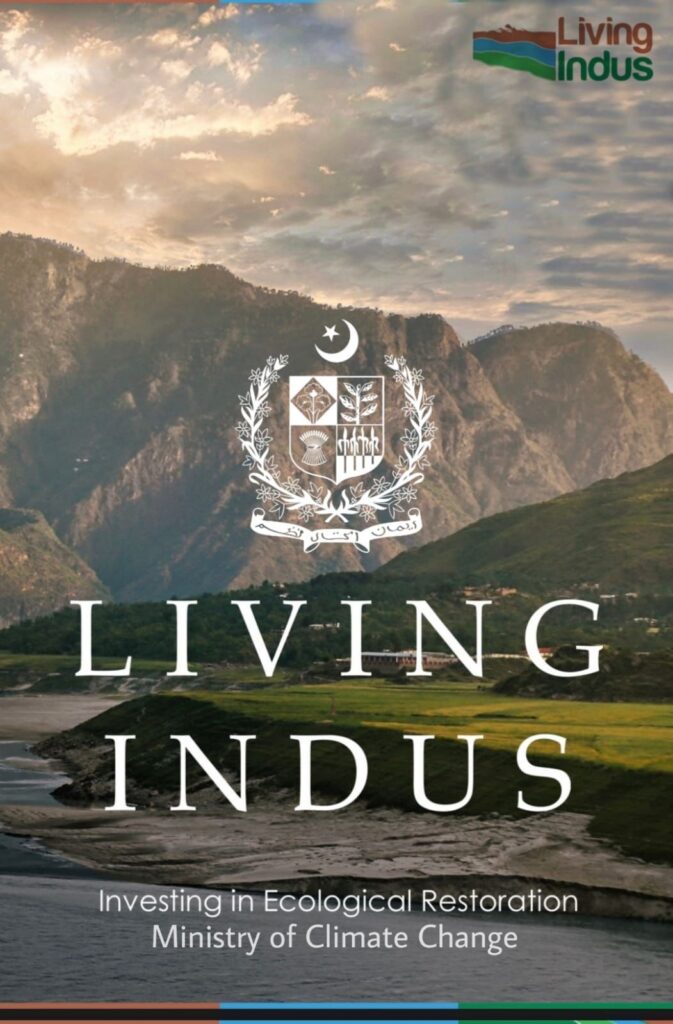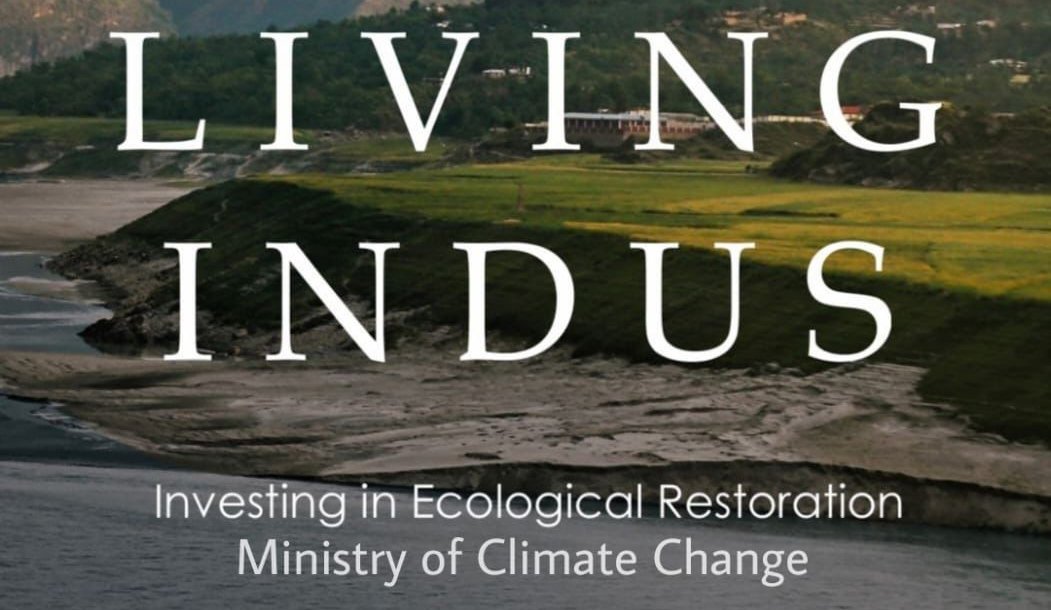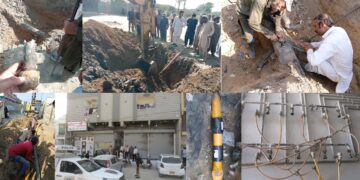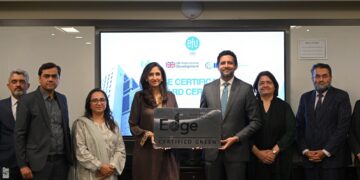After presenting and gaining approval for the Living Indus Initiative to the Cabinet, one of the country’s largest climate resilience projects built in partnership with the UN, the Federal Minister Sherry Rehman said it is high time we pushed forward an Axis of Adaptation for building our defences against the onset of accelerated climate change.
Launching Pakistan’s biggest climate project after extensive provincial and stakeholder consultations, Minister Rehman stated that, “Given the devastation all around us from catastrophic flooding from the Monster Monsoon, building climate resilience via adaptation planning is the most urgent need of the moment to protect our population with initiatives that replenish and recharge our jugular vein for food, livelihood, and water security. River Indus is the lifeline of the country, supporting 80% of Pakistan’s agriculture and 3/4ths of its economy. Pakistan is within one of the largest floodplains in the world, as 9 out of 10 of our largest cities are located within 50km of the Indus. The River serves as one of our biggest carbon sinks and is constantly under threat from the drastic impacts of climate change. Despite the rains and groundwater recharge due to the ongoing floods, Pakistan is still going to face water scarcity in the near future, so it is imperative we take strategic actions via our provinces to ensure that River Indus and the connected livelihoods, biodiversity and people are adapted to the future impacts. This is one of the largest ventures of its kind in Pakistan’s history that will move from the north down to the base of the Indus Delta in the south. ”


“Despite the acute and catastrophic flooding today, climate impact creates extreme weather which is why Pakistan is projected to hit acute water scarcity by 2025. We have undertaken an extensive exercise across the country to identify adaptation and mitigation initiatives to build urgently needed resilience of the Indus River in the context of future climate disasters. Living Indus, is one of the umbrella initiative that addresses the triple planetary crisis of climate change, biodiversity loss, and pollution. The initiative is being undertaken in partnership with FAO. Pakistan has been placed in the top 10 high-risk countries in the world by the World Risk Index 2022 and floods have already affected our critical sectors like food, health and economy, making adaptation is the urgent need of the hour.
Climate Change is a clear national security challenge for the country and Pakistan’s natural resources including the Indus and its ecosystem are under massive pressure from the inexorable changing climate, unpredictable temperatures rise, disruptive rain patterns and melting glaciers.”
Stating the details of the project, Minister Rehman said, that “The initiative, proposes a menu of 25 interventions that aim to address serious climate challenges on the ground with an emphasis on nature-based solutions, green infrastructure and ecosystem-based adaptation approaches to protect, conserve and restore natural, freshwater, coastal and marine ecosystems. These interventions cut across multiple sectors like Agriculture, Forestation, Urban Resilience, Waste, Pollution and Blue Economy. The initiative stems from a growing demand of the people of Pakistan and communities, for action to ensure a healthy, stable and resilient future. The initiatives are in line with Pakistan’s climate mitigation and adaptation commitments, with 16 interventions creating flood resilience in the vulnerable parts of the country. The project will be implemented by the provinces under the guidance of the federal ministry.
Out of 25, we have outlined 8 immediate priority yet strategic actions in this initiative. The Green Infrastructure for Flood Control and Groundwater Recharge is the first priority intervention which is the need of the hour and promises benefits such as reduced flood risks, increased water security, improved food security and climate-resilient livelihood.
“Second is, the Indus Clean up and Urban Effluent Treatment initiative that has been designed to clean the Indus of pollutants through waste management. Then Nature-based Resilient Agriculture component of the project will restore agricultural livelihoods and improve water distribution in water stressed area. Fourth component of the project is on Salinity Control in the Lower Indus that will ensure protection of the river against sea encroachment. Sustainable Aqua-culture and Fisheries Management is an intervention to restore the biodiversity of the River Indus through an integrated approach for sustainable management of inland fisheries. The sixth initiative will constitute actions on Climate Resilience of the Indus Delta and proposes to develop an integrated coastal zone management plan for the entire coastal belt of Sindh and Balochistan.”
“The project will also work directly with communities for artificial recharge for conservation of rainwater both above and underground by creating 100,000 Community Ponds with ownership of the concerned communities. Participation of citizens especially communities depending on the river is critical for the success of this project. The eighth strategic action will focus on Sustainable Groundwater Governance through enactment of Provincial Water Acts in Balochistan and Sindh. It will also build the capacity of the provinces to implement all groundwater legislations across Pakistan.”
The rest of the interventions are;
1. A Living Indus Knowledge Platform: Crowd sourcing knowledge
2. Indus Trust Fund
3. Climate and Nature Performance Bonds for a Living Indus
4. Social Entrepreneurship for a Climate Resilient Indus
5. Community Access to Clean Energy
6. Zero Plastic Waste Cities Along the Indus
7. Urban Forests along the Indus
8. Indus Protection Act
9. Indus Protected Areas
10. Build Back Biodiversity in the Indus Basin
11. Community-based Ecotourism
12. Indus Heritage Sites
13. Nature-based Watershed Management
14. Expanded GLOF-II
15. Promoting Permaculture
16. Managing Agricultural Wastewater
17. Telling the Indus Story
I am extremely grateful to FAO for their partnership with us on this project and for their immense support in getting it off the ground.
As we wait for the floodwaters to recede, the priorities of this initiative will ensure a long-term adaptation of the Indus and the livelihoods, agriculture, cities, and the biodiversity that depend on it, a chance of surviving climate change. If we do not act, the Indus is at risk of converting from a carbon sink to a carbon source. In the Age of Adaptation, the Living Indus Initiative presents a key opportunity for achieving resilient recovery for Pakistan.”



















